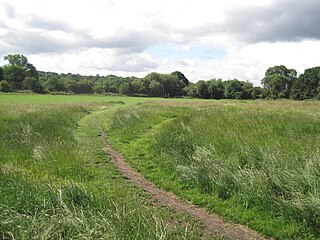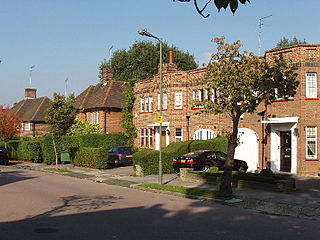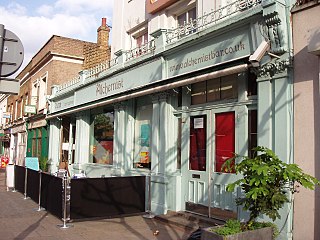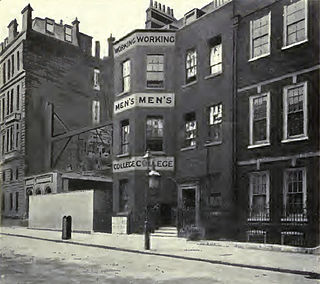
Kilburn is an area in the north-western edge of Central London, in the London Boroughs of Camden, Brent and the City of Westminster. Kilburn High Road railway station lies 3.5 miles (5.6 km) north-west of Charing Cross.

Hampstead Heath is an ancient heath in London, spanning 320 hectares. This grassy public space sits astride a sandy ridge, one of the highest points in London, running from Hampstead to Highgate, which rests on a band of London Clay. The heath is rambling and hilly, embracing ponds, recent and ancient woodlands, a lido, playgrounds, and a training track, and it adjoins the former stately home of Kenwood House and its estate. The south-east part of the heath is Parliament Hill, from which the view over London is protected by law.

Maida Vale is an affluent residential district in West London, England, north of Paddington, southwest of St John's Wood and south of Kilburn, on Edgware Road. It is part of the City of Westminster and is three miles northwest of Charing Cross. It has many late Victorian and Edwardian blocks of mansion flats. The area is home to the BBC Maida Vale Studios.

Dame Henrietta Octavia Weston Barnett, DBE was an English social reformer, educationist, and author. She and her husband, Samuel Augustus Barnett, founded the first "University Settlement" at Toynbee Hall in 1884. They also worked to establish the model Hampstead Garden Suburb in the early 20th century.

Hampstead Garden Suburb is an elevated suburb of London, north of Hampstead, west of Highgate and east of Golders Green. It is known for its intellectual, liberal, artistic, musical and literary associations. It is an example of early twentieth-century domestic architecture and town planning in the London Borough of Barnet, northwest London.

The Spaniards Inn is a historic pub on Spaniards Road between Hampstead and Highgate in London, England. It lies on the edge of Hampstead Heath near Kenwood House. It is a Grade II listed building, dating back to the 16th century.
Thomas Geoffry Lucas, generally known as Geoffry Lucas, but often found incorrectly spelt as Geoffrey Lucas, was a 20th-century English architect. He is perhaps best known for his work in connection with the garden city movement, but was also active in other areas, including the design of churches and church fittings.

The London Borough of Camden is a borough in Inner London, England. Camden Town Hall, on Euston Road, lies 1.4 mi (2.3 km) north of Charing Cross. The borough was established on 1 April 1965 from the former metropolitan boroughs of Holborn, St Pancras and Hampstead.

The Magdala, also known as The Magdala Tavern or colloquially as simply The Magy, is a pub on South Hill Park in Hampstead, north London. Named after the British victory in the 1868 Battle of Magdala, it was the site of a notorious murder in 1955.
Samuel Knight Samuel Knight.

The Carlton Tavern is a pub in Kilburn, London, originally completed in 1921, that was illegally demolished in 2015 by Tel Aviv-based developer CLTX, which had failed to obtain the necessary planning permission. Westminster City Council subsequently ordered the pub to be rebuilt. It reopened on 12 April 2021. The pub was the only building in the street to survive the Blitz during World War II.

The Alchemist is a former pub at 225 St John's Hill, Battersea, London, that was controversially demolished in May 2015 after over 100 years in business, and rebuilt in 2018.

Albert Edward Kingwell was an English architect, surveyor and land agent who was one of the first to use concrete in his practice. He oversaw the Jack Estate at Hadley Wood in Hertfordshire for more than 50 years.

William Allen Dixon (1821–1893) was a British architect who specialised in the design of churches and particularly Baptist churches. His heyday was in the late 1860s to the early 1870s when he designed at least five church in England, several of which are grade II listed buildings.

George William Potter was a builder, estate agent and surveyor in Hampstead, London, whose firm contributed to the modern development of Hampstead and Hampstead Garden Suburb. As a builder, he constructed the houses in Gayton Crescent and Gayton Road. Late in life he wrote two books of recollections of the history of Hampstead.

Frank Wallace Galton, sometimes known as Frank Wallis Galton, was an English political writer and journalist who was secretary to Sidney and Beatrice Webb and later to the Fabian Society. In 1929, he was appointed to the Royal Commission on Transport.

Michael Frank Wharlton Bunney MBE (1873–1927) was an English architect who was closely associated with the development of Hampstead Garden Suburb.

George Treacher was a Victorian architect known for his pub designs.

Agnes Fraser Elder Fraser-Smith was a Scottish actress and soprano, known as Agnes Fraser, who appeared in the later Savoy Operas and in Edwardian musical comedy. She married the Gilbert and Sullivan performer Walter Passmore, with whom she frequently appeared on stage.
Langford Reed was a British author, writer and collector of limericks, scriptwriter, director and actor of the silent film era.



















